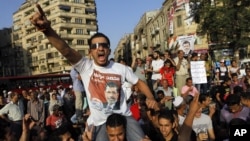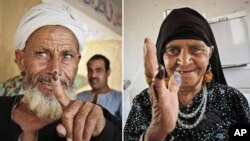CAIRO - The Muslim Brotherhood's Mohamed Morsi is poised to become Egypt's first post-revolution president. With most of the votes counted, the widely-presumed next leader will likely face a power struggle with the nation's military.
The sweeping consolidation of power by the Supreme Council of the Armed Forces, or SCAF, almost overshadowed Morsi's claim to victory. But in a country braced for a win by his rival, former Prime Minister Ahmed Shafiq, who also is claiming the lead, both moves took many Egyptians by surprise.
After the polls closed Sunday, the SCAF issued a constitutional declaration granting itself legislative powers, control of the economy and the right to pick who will draft the next constitution. The announcement followed the Supreme Council's formal, court-ordered dissolution of the Islamist-led parliament the day before.
On Monday, with news of Morsi's lead solidifying, the military conveyed it would share in guiding the country.
General Mamdouh Shaheen said the SCAF had replaced the parliament and would discuss draft laws with the new president. He described the process as a balance between the Supreme Council and the head of state.
Morsi's Freedom and Justice Party, or FJP, appeared ready to push back against the military's newly-acquired powers, which came only two weeks before the SCAF had promised to hand over power to civilian rule.
Egypt Interim Constitution Declaration
Egypt's Interim Constitution Declaration- Published by ruling Supreme Council of the Armed Forces on June 17
- Amends the council's Constitutional Declaration of March 2011
- Requires next president to take oath of office before the Supreme Constitutional Court because parliament is dissolved
- Gives Supreme Council of the Armed Forces authority over all affairs of the military
- Makes council chairman, Field Marshal Hussein Tantawi, armed forces commander, defense minister
- Gives military leaders power to appoint panel to draft new constitution
- Postpones new parliamentary elections until new constitution is approved
- Grants military leaders powers to initiate legislation until new parliament elected
Some members of the FJP-dominated parliament have refused to recognize the ruling disbanding it. Some have vowed to stage protests or try to enter the building on Tuesday. Security forces have surrounded the parliament.
At a news conference on Monday, Morsi called for calm. Morsi said he is seeking stability and love in a civic, national democratic and modern state.
Ahmed Shafiq's campaign said their candidate has a slight lead and that Morsi had hijacked the election.
Voter turnout in the runoff election was low, an apparent sign of little enthusiasm about the two candidates, neither of whom many voters say represents their vision for Egypt's future.
For many of the people who took part in last year's uprising, the choice was particularly grim, prompting some to boycott the vote or go to polls and nullify their ballots.
Cairo University political scientist Hassan Nafaa says the problem is that the military has shown little acknowledgement of last year's protests.
"The thing is whether you under recognize that there has been a big revolution in this country or not; and what are the needs, what are the mistakes committed by the old regime? If you draw these kinds of lessons and you try to redress the situation, maybe you will succeed. But they have a set of mind that is not capable of drawing the right lessons," he said.
Watch the interview with Hassan Nafaa
"The thing is whether you under recognize that there has been a big revolution in this country or not; and what are the needs, what are the mistakes committed by the old regime? If you draw these kinds of lessons and you try to redress the situation, maybe you will succeed. But they have a set of mind that is not capable of drawing the right lessons," he said.
Watch the interview with Hassan Nafaa
The potential showdown between the two major forces in Egypt of the past half-century, the military and the Muslim Brotherhood, have many people concerned about something similar to the Algerian civil war of the 1990s, when an Islamist victory at the polls was canceled.
But Hassan Nafaa says the military, which is seen by many people here as a guarantor of stability, would not engage in armed conflict with fellow Egyptians. "I don't think there will be a repetition of what happened in Algeria in Egypt. It is a different country and a different mentality and a different balance of forces," he said.
Nafaa does not rule out the possibility of some violence in the wake of the election, but he says the biggest fight will be a political power struggle.
The SCAF's declaration lays out a timeframe for writing the constitution and holding new elections for parliament - raising the possibility that Egypt's political limbo, now 16 months old, could continue until the end of the year.





